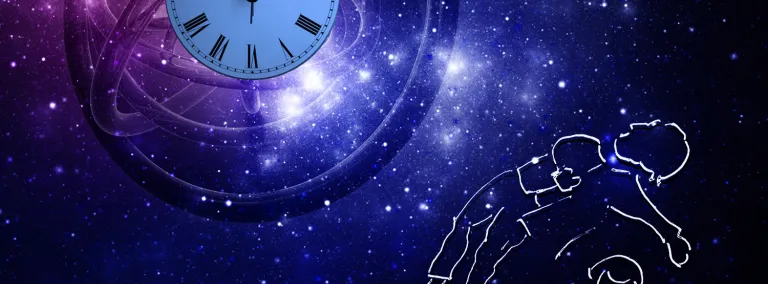Destiny and scientific theory collide in "now then again"
Discover a new twist on destiny during Neutrino Day’s stage performance of “now then again” by Penny Penniston
Penny Penniston’s play, “now then again,” highlights the romance of science while questioning the theory of destiny. What if science could prove that interactions in our future could influence our actions of the past? It is a compelling idea that intrigues the minds of scientists and novices alike.
Penniston lives in Chicago and is excited that her play will run during Sanford Underground Research Facility’s Neutrino Day celebration. “I live in a big city so it will be a treat to be someplace a little bit more out in the open and surrounded by nature.” She is looking forward to visiting Sanford Lab and exploring the Black Hills. Her role during Neutrino Day will be part tourist and part presenter.
Self-proclaimed “popular science geek” and science novice, Penniston began writing “now then again” to illustrate that science is romantic. “Nature is this force of beauty and this untamed thing that gives us a glimpse into the universe’s mysteries and the idea that pursuit of science could be a passion,” said Penninston. “We tend to think that science is kind of cold and clinical, but the things that drive scientists are really pretty romantic ideas.”
Set in Fermilab, “now then again” theorizes how the future can impact the past. The point at which two objects collide appears to send ripples through the past, present and future and can affect the trajectory of their path through time. The play follows Henry and Ginny from the moment they collide in a fascinating spin on the concept of destiny. This idea is echoed throughout the play by Felix, a friend of Henry’s, when he says, “The really big decisions in life aren’t the ones that change the future. Changing the future is easy. No, the big ones come when we change the past.”
Merlyn Q. Sell, who is the director of the play for Lead’s Gold Camp Players, is enthusiastic about the upcoming performance. “‘Now then again’ explores the effects of theory turned to reality,” Sell said. “In a world where many of us can feel trapped, fearful of the future and burdened by our daily obligations, ‘now then again’ offers hope—not in the form of magic or fantasy, but in a far more recognizable, if no less extraordinary, way. The play serves as a poignant reminder of how limitless our world can be and the wonders that are only just one discovery away.”
Penniston, herself, doesn’t believe people are meant to do things or that the future is inevitable. “I believe that what the future does is to give the past meaning,” explained Penniston. “It constructs the narrative that we tell ourselves about the past.”
Audience members do not need to have a scientific background to appreciate the theory behind “now then again.” Spirited discussions following the play are standard and Penniston enjoys being included. She describes her perception of this theory with the exact moment that she met her husband, which may not have felt significant at the time. However, once they were married, that moment became significant. “It became the beginning of a story,” she said.
So, is our future destined to be? Is love a product of statistical probability? Will science prove that the future can manipulate the past? Experiencing “now then again” will have you asking these questions and more.
“Now then again” will run Friday and Saturday, July 7-8, at 6 p.m. at the Historic Homestake Opera House in Lead. A reception will be held Friday at 5:15 p.m.; a Q&A will follow. For more information and a full list of Neutrino Day events visit the Sanford Lab Neutrino Day page.
